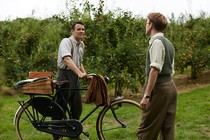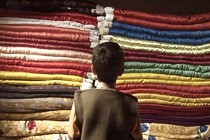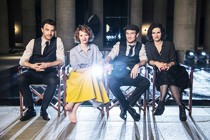Anonymous, Emmerich delivers a Shakespearean blockbuster
To be or not to be. But was William Shakespeare or was he not? Woody Allen asked himself who wrote Hamlet and King Lear. "The naïve will answer with conviction: the eternal Bard from Stratford-on-Avon. Now ask the same question to the experts and don’t be surprised if they answer Sir Francis Bacon, Ben Jonson, Christopher Marlowe, Queen Elizabeth and maybe even the Habeas Corpus".
This very vexata quaestio, which over the years has troubled Mark Twain, Charles Dickens, Sigmund Freud, Orson Welles, is at the heart of the great return in Europe of the king of Hollywood disaster movies, Roland Emmerich, with Anonymous [+see also:
trailer
interview: Rhys Ifans
interview: Roland Emmerich
interview: The cast of Roland Emmerich…
film profile]. The German director, named "das Spielbergle aus Sindelfingen" ("Little Spielberg from Sindelfingen" in Southern German dialect), started in 1977 in a film school in Monaco, divided between worshipping authors such as Fassbinder and Wenders and a fascination for Star Wars. And today he looks on the world from the great heights of his 800 million dollars cashed in with Independence Day and with the commercail success of
Anonymous is introduced with an account from Shakespearean actor Derek Jacobi, who is a member of the Shakespeare Authorship Coalition (doubtaboutwill.org). And the film argues that the author of Shakespeare’s works was Edward De Vere, Earl of Oxford, played by a forty year-old actor who is one of the most representative of recent British cinema, Welshman Rhys Ifans (Notting Hill, The Boat that Rocked).
In the second half of the 16th century the Earl of Oxford is the lover of the legendary Elizabeth I (Joely Richardson as a young, and Vanessa Redgrave as the older Elizabeth), called the Virgin Queen, who was for a long time at the centre of the European politicial scene, with all its religious conflicts and wars. But the Elizabethian era was also one of extraordinary artistic and cultural flourishing. Not in the least attracted by the intrigues of power, the Earl of Oxford dedicates himself with tireless artistic fervour to drafting tens of sonets, poems, tragedies and comedies. And he identifies young playwright Ben Jonson (Sebastian Armesto) as the man who could bring his works to the audiences’ attention, by passing himself off as the author of those eternal pieces of writing. Instead, authorship will be stolen by a vain and arrogant small-time actor called William Shakespeare (Rafe Spall).
The film blends the literary plot with the romantic, which harbours even greater surprises, with flashbacks and pseudo-historical twists. A sooty and oppressive Elizabethan London is reconstructed with a wealth of details through the photography of Anna Foerster, set design by Sebastian T. Krawinkel and constumes by Lisy Christl. Emmerich uses, as he does for his blockbusters, deep focus shots in order to focus in on and bring together actors and the spaces they are in, without running the risk of spilling over into authorship.
But beyond the glitzy costume blockbuster, the story manages to amaze because of its implications: Anonymous not only asks question about "the power of making theatre" but also about the immense power of writing. As the great literary American critic Harold Bloom suggested in his essay "Shakespeare: The Invention of the Human", the poet, by inventing what became the most consolidated method of depicting a character and human personality through language, also invented man as we know him. It is literature (like cinema) which inflicts on our life and not vice-versa. And the dream-machine called cinema crafts the material of which we are made.
(Translated from Italian)
Did you enjoy reading this article? Please subscribe to our newsletter to receive more stories like this directly in your inbox.




















